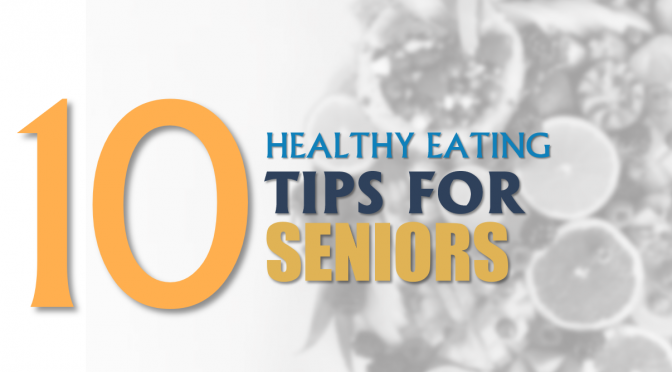As we all know, when we increase in age our metabolism decreases. As a result, our food intake has a higher level of importance compared to when we were in our 20’s or 30’s. Here are some quick and easy tips to eating healthier and living a longer life.
- Eat a variety of foods
Some of us stick to our favorite foods, and aren’t open to trying anything new. To ensure that we are getting all of the necessary vitamins needed, we must have a well-balanced diet. According to the National Council on Aging, our meals need to consist of fruits, whole grains, vegetables, low-fat dairy, and lean meats. Not only will this meal make your body feel amazing, but it will look more amazing, too.
- Minimize the salt
As we age, our sense of taste becomes weaker and we try to compensate for that by using extra salt. According to many studies, salt has a direct connection to high blood pressure. We know that stress, lack of physical activity, some medications, and a whole list of other factors can lead to hypertension. To combat this, exchange some of the salt for fresh herbs and spices. Herbs and spices like basil, cardamom, garlic and ginger are known to lower blood pressure. These ingredients also add a punch of bright flavor where you might normally add salt.
- Drink more water
We all need water to survive. Our muscles are about 70% water, our brains are about 85% water, and our blood is about 80% water. Not only do these percentages show we obviously need water, but our body gives physical signs when it is lacking water. Drinking fresh juice and some sugary drinks are okay once in a while, but water needs to the main source of hydration in our diets. You may be surprised how much better you feel just by upping your daily water intake!
- Read the labels
Sometimes we can fall into the habit of buying the same things. We should question ourselves and ask “How often do I read the nutrition label?” Those labels are not there to take up space, they actually hold real value. Some of the numbers on the labels may shock you. The next time you’re shopping, take a peak at the nutrition labels and see what you find.
- Consider supplements
Some of us are taking a lot of pills, medications, and other things already, and the thought of adding another thing to the list is overwhelming. Fruits and vegetables are great sources for vitamins, but in some cases they’re just not enough. For example, people over the age of 50 do not get enough vitamin B12 according to the Academy of Nutrition and Dietetics. Talk to your doctor and see what they supplements they recommend for you.
- Reduce sugar
Reducing the sugar in our diets is something many dietitians and nutritionists agree on throughout the world of nutrition. We should aim to exchange some of our sugary snacks and treats with fresh fruits. According to the Academy of Nutrition and Dietetics, strawberries are great for eyes and contain plenty of vitamin C. Vitamin C is an antioxidant that can help lower your risk of cataracts.
- Eat more Kale, if you can
Kale is an amazing source of lutein and zeaxanthin, both are needed for healthy eyes and retina protection. Kale can help protect our eyes from sun damage, lower the risk of cataracts, and it can help protect our eye from macular degeneration. Even though this amazing leafy-green can help many, some of us who are taking blood thinners like Coumadin, and others who have a cruciferous vegetable allergy should speak to their doctors before eating kale.
- Try Green Tea
According to many studies, green tea has been considered to help reduce our risk of cancer, neurodegenerative diseases, and more. The studies referenced here focus on breast, prostate, and colorectal cancer. Not only does green tea help with lowering our risk of cancer, it can also help lower our risk of Alzheimer’s and Parkinson’s. Both diseases are classified as neurodegenerative, and studies show that the compounds in green tea can have various protective effects on neurons.
- Not all fats are bad
Omega-3 fatty acids are essential for good brain health. Studies shows that is can help with improving healthy memory function. Seafood and fatty fish is an amazing source of omega-3 fatty acids. Not everyone likes fish, for those of us who doesn’t , plant sources like nuts and seed also contain omega-3 fatty acid.
- Enjoy your food
Eating is not only necessary for living, it can add the spice life that we all need. So have fun, make revisions to old recipes, and share your knowledge of food to the younger generations.
Leave a comment and tell us which tip are you most excited about trying.
